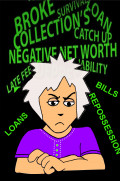Financial Tips And Advice For The Deceased: Can Bill Collectors Collect From The Dead On Their Debts?
"Nothing is certain but death and taxes."
Now does that mean that the dead have to get out of debt even after they've gone on to the next world?
You might want to consider this......A recent story in the McClatchy-Tribue News Service hatched this statement "Death is no excuse for not paying your bills."
With the downturn in our economy, it seems that bill collectors are becoming more and more aggressive in trying to collect unpaid debts, even going so far as to contact family members who have just lost a loved one.
Are family members responsible for their loved ones' debts?
In almost every case NO!! Then why do the bill collectors keep hounding them then?
Because they want their money and they'll go about it just about any way they can.....even if it means strongarming family members and trying to convince them that they need to pay the person's debts.
Currently the Federal Trade Commission is establishing rules that will eliminate some of these aggressive tactics and make consumers more aware that they are not responsible for their loved ones' debts.

Rights of Family of the Deceased
The fact of the matter is, debt collectors can (and should) say that they are calling to collect on someone's debts but not from friends and family.
They can and should say that they are inquiring into collecting money from the deceased's estate.
However, unfortunately as the economy tanks, debt collectors are using a "spare-no-punches" attitude when it comes to trying to bully family members that they are the ones who need to pay the bills and they need to pay them NOW.
Why are debt collectors even allowed to contact the family of the deceased?
Because of the Fair Debt Collections Practices Act of 1977, which gives them the authority to contact a spouse, family members, related third parties, friends or even an executor of the estate!
In their zeal to collect unpaid debts, it has become common practice for bill collectors to use whatever means they think they can get away with to mislead or guilt family members and even friends into thinking they have obligations to pay the deceased's bills, which they do not.
As a matter of fact, debt collectors are not even supposed to bring up the matter of the debt to the family or friends when they call.
Again, he or she can say that they are calling about the deceased's financial affairs but they are not allowed to mention the debts owed.....to anyone.
The FTC is trying to change this so that the collectors would be allowed at the beginning of the conversation to introduce the subject of debt collection but they are also stressing with this rule that the bill collectors are supposed to inform the relatives or friends of the deceased that in most cases, they are not responsible at all for the debt.
Will the estate be responsible? It's possible but that is really not the question. It's the responsibility of the debt collectors to make it crystal clear that his or her estate may be responsible but by no means is any individual responsible for the debt, no matter how small or how large.
It is important to note that in some states, however, with community property laws, the spouse can be financially responsible for the deceased's debts. Someone wanting to know their liability can always check with someone in the know such as the National Consumer Law Center or legal services or even better, a private attorney.
The Federal Trade Commission is also considering the possibility of suggesting a "grace period" or more appropriately stated a "grief period" before debt collectors can begin contacting family members, friends or executors of the estate regarding unpaid debts. It's been suggested that the grace period would extend to at least 1 month.
This would eliminate some of the stress on the grieving individuals who are faced with an overly aggressive bill collector who is trying to get the first person he talks to on the phone to pay!
Curiously, some debt does not have to be paid back at all because of a statute of limitations.
The article delivered by Newstex states that in California, most debt obligations more than 4 years old including credit card debt do not have to be repaid at all....ever....end of story.
The best case scenario in this issue is for the FTC to provide protection for family and friends who are grieving and to stop debt collectors from trying to exploit people when they are at their most vulnerable.

Do The Dead Have To Get Out of Debt?
In summary, be aware that in the way of the world, there will always be people out there who try and bully their way through no matter what the circumstances.
Bill or debt collectors have to be aggressive people to begin with and it is a thankless job. However, the general public should be aware of the laws pertinent to their own state such as community property laws, statute of limitations, forgiveness of debt, etc. and in what circumstances they apply.
That sounds really easy but when you're faced with the sudden death of someone and then the doggedness of certain bill collectors, it might be easier said than done to mount a defense against bullying tactics.
However, know that there are people out there who can help solve the mystery of whether the deceased is going to have to get out of debt through someone else....but in almost every case, the debts go against the estate and if there is nothing in the estate to collect on, the debt cannot be passed on to spouses, heirs, friends or trustees.
Hopefully in the near future, the Federal Trade Commission will give stiff penalties to debt collectors who ruthlessly attack family members, friends and even executors in an effort to make their numbers look better in terms of the more debt that they can collect.
A good point could also be made for keeping our financial lives in order so that in the event of our demise, our family would know what the financial climate is already and we would not have to "hope" that our family or friends did not fall prey to strong-arm debt collecting tactics and that we can in fact, rest in peace!

Dave Ramsey on Debt Collectors

More Reading on Debt Collectors
- Can a Debt Collector Take Your House?
Debt collectors have the right to do a plethora of unpleasant things such as call you, track you down by calling your friends, family members, and place of employment, and even file a lawsuit against you. A... - Do Debt Collectors Call YOUR House? Understanding th...
Debt collectortwo words you'd probably rather not hear. Most, if not all of us, have at one point or another been contacted by a debt collector (yes, including me!). No doubt about it, debt collectors are... - Debt Attorney Advice: What to Say When You Get a Cal...
Drowning in credit card debt? Have thousands of dollars in medical bills? Facing foreclosure? No matter how you got in debt, if you cant pay your bills, the calls from debt collectors will start. And... - Battling Consumer Debt Collectors Part 2: I Do Not O...
It is not uncommon for creditors to send disputed accounts to collectors. Most of the credit in the United States is held by a handful of HUGE banks that do not address consumer disputes very well. If a bill... - Debt Collectors Abuse of Power
Debt Collectors driving you Crazy? In this one of the worst recessions since the Great Depression; it's a terrible feeling when you have to discontinue paying a bill that you had been paying in a timely... - How to Deal With Scavenger Debt Collectors and Zombi...
Scavenger debt collectors can turn your happy, financially content little world into a chaotic nightmare. Scavenger debt collectors are the bottom feeders of the collection industry (as if the collection... - Dealing with debt collectors
When you get into arrears with your debt payments, one of the most unpleasant things you have to deal with is being chased by debt collectors, often to a point of harassment. This page tells you how to deal... - Why You Should Never Pay a Debt Collector Without Va...
Have you gotten one of those lovely - When the Debt Collector Calls
It is around 6 PM and you are just sitting down to dinner and the phone rings. You look at your caller ID and it says - Letters to make debt collectors stop calling you
When you find yourself being harassed by debt collectors, you can easily get them to go away lawfully provided you know the game. The key is to respond quickly and force them to prove their initial claims or...










